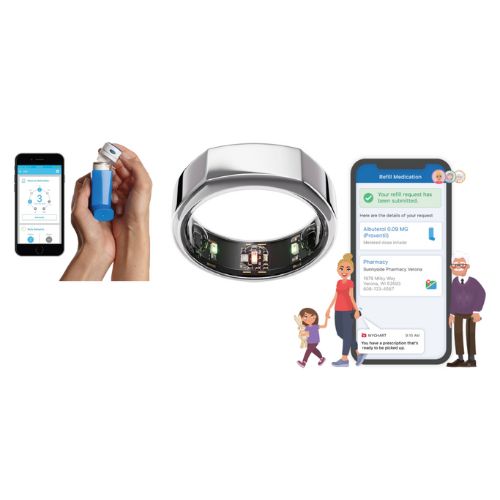
5 minute read
Health Tech Tools
In an era where technology has become an integral part of our daily lives, it’s no surprise that it’s revolutionizing the healthcare industry too. From wearable devices to telemedicine platforms, health tech tools are empowering your clients to take charge of their well-being like before. Here’s a glimpse into some of the best health tech tools shaping the landscape of modern healthcare:
By Emma Peters
Fitness Trackers: Devices like Fitbit, Apple Watch, and Garmin have become ubiquitous in tracking daily physical activity, heart rate, sleep patterns, and more. They provide real-time feedback, motivating users to stay active and make healthier choices.
Telemedicine Platforms: Telemedicine has surged in popularity, especially in recent times, offering remote consultations with healthcare professionals through video calls or chats. Platforms like Amwell, Teladoc, and Doctor On Demand provide convenient access to medical advice and prescriptions without the need for in-person visits.
Mental Health Apps: Mental health awareness has seen a significant rise, and so have the apps catering to it. Tools like Headspace, Calm, and Talkspace offer guided meditation, therapy sessions, and mood tracking, helping users manage stress, anxiety, and depression from the comfort of their homes.
Nutrition Apps: Maintaining a balanced diet is crucial for overall health, and nutrition apps like MyFitnessPal, Lose It!, and Cronometer make it easier than ever. They track food intake, provide personalized meal plans, and offer insights into nutritional content, empowering users to make informed dietary choices.
Smart Scales and Body Analyzers: Beyond just measuring weight, smart scales like Withings Body+ and FitTrack analyze body composition, including muscle mass, body fat percentage, and water retention. This comprehensive data offers a deeper understanding of one’s health and fitness progress.
Remote Monitoring Devices: For individuals with chronic conditions, remote monitoring devices like blood pressure monitors, glucose meters, and pulse oximeters provide invaluable insights into their health status. These devices enable users to track vital signs regularly and share data with healthcare providers for proactive management of their conditions.
Health Apps for Chronic Disease Management:
Conditions such as diabetes, hypertension, and asthma require diligent management, and health apps like Livongo, Omada Health, and Propeller Health offer tailored solutions. They provide personalized coaching, medication reminders, and behavior tracking to help individuals better manage their chronic diseases.
Sleep Trackers: Quality sleep is essential for overall health and well-being, and sleep trackers like Sleep Cycle, Oura Ring, and Beddit monitor sleep patterns and offer insights to improve sleep quality. By tracking factors like sleep duration, cycles, and disturbances, users can identify areas for improvement and adopt healthier sleep habits.
Online Medical Records Trackers: Platforms such as MyChart offer patients personalized and secure online access to portions of their medical records. It enables patients to securely use the Internet to help manage and receive information about your health and connect with their medical care team.
For more information on some rankings for these health tech devices, here are lists which have been compiled for fitness trackers and telemedicine platforms.
Which of these tools are covered by health insurance?
Since many of these digital health tools are newer and in various development phases, health insurance companies have been slower in providing coverage for their clients. However, as some of these devices have become more commonplace in healthcare spaces, they have been insured by certain companies. Telemedicine and Telehealth are tools that are the most widely covered by health insurance. According to HealthNews “Since COVID-19 made virtual consultants the norm, telehealth apps such as Doctor on Demand, Amwell, and Talkspace for mental health therapy have become widely accepted in the medical community. Most insurers these days
cover some of the cost of telehealth appointments. You usually must fulfill specific privacy requirements to get your appointment covered, but it isn’t difficult”. If your clients are covered by government programs such as Medicare or Medicaid, they will most likely have access to these services. The AMA found that Medicare and Medicare Advantage plans cover all 21 digital medicine services. Although it’s taking longer for commercial payers to cover digital medicine, they are slowly expanding coverage as these tools are more integrated in healthcare. On some SCAN Medicare Advantage Health plans, there are fitness tracker benefits (you can order a free FitBit every two years). SCAN also provides free membership for apps and online programs such as Rally and BrainHQ. Click here to discover which health tech platforms are available to SCAN members.
These are just a few examples of the myriad health tech tools available today, each offering unique benefits and functionalities. As technology continues to evolve, we can expect even more innovative solutions to emerge, further empowering individuals to prioritize and optimize their health journey. It’s important that health insurance professionals are kept up to date with these health tech tools that would best support their clients and are aware of what is covered by their specific health insurance plan.
Let us know which devices you like and if you are offering any to your clients.
We want to share good ideas and your success stories with the Cal Broker community, so we can all stay informed and up-to-date.
Email Emma@calbrokermag.com










